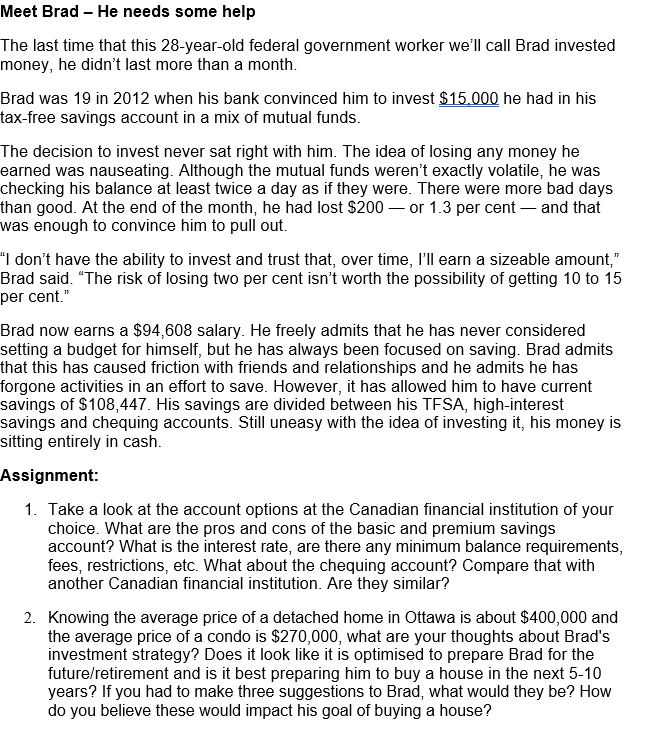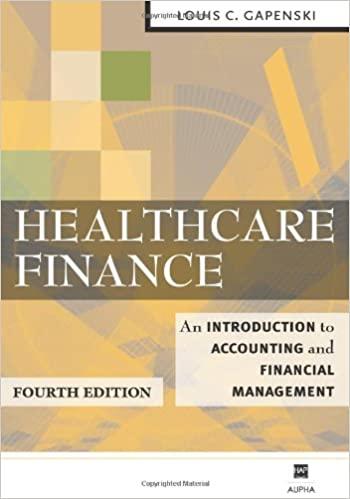
Meet Brad - He needs some help The last time that this 28-year-old federal government worker we'll call Brad invested money, he didn't last more than a month. Brad was 19 in 2012 when his bank convinced him to invest $15.000 he had in his tax-free savings account in a mix of mutual funds. The decision to invest never sat right with him. The idea of losing any money he earned was nauseating. Although the mutual funds weren't exactly volatile, he was checking his balance at least twice a day as if they were. There were more bad days than good. At the end of the month, he had lost $200 or 1.3 per cent - and that was enough to convince him to pull out. "I don't have the ability to invest and trust that, over time, I'll earn a sizeable amount," Brad said. The risk of losing two per cent isn't worth the possibility of getting 10 to 15 per cent." Brad now earns a $94,608 salary. He freely admits that he has never considered setting a budget for himself, but he has always been focused on saving. Brad admits that this has caused friction with friends and relationships and he admits he has forgone activities in an effort to save. However, it has allowed him to have current savings of $108,447. His savings are divided between his TFSA, high-interest savings and chequing accounts. Still uneasy with the idea of investing it, his money is sitting entirely in cash. Assignment: 1. Take a look at the account options at the Canadian financial institution of your choice. What are the pros and cons of the basic and premium savings account? What is the interest rate, are there any minimum balance requirements, fees, restrictions, etc. What about the chequing account? Compare that with another Canadian financial institution. Are they similar? 2. Knowing the average price of a detached home in Ottawa is about $400,000 and the average price of a condo is $270,000, what are your thoughts about Brad's investment strategy? Does it look like it is optimised to prepare Brad for the future/retirement and is it best preparing him to buy a house in the next 5-10 years? If you had to make three suggestions to Brad, what would they be? How do you believe these would impact his goal of buying a house? Meet Brad - He needs some help The last time that this 28-year-old federal government worker we'll call Brad invested money, he didn't last more than a month. Brad was 19 in 2012 when his bank convinced him to invest $15.000 he had in his tax-free savings account in a mix of mutual funds. The decision to invest never sat right with him. The idea of losing any money he earned was nauseating. Although the mutual funds weren't exactly volatile, he was checking his balance at least twice a day as if they were. There were more bad days than good. At the end of the month, he had lost $200 or 1.3 per cent - and that was enough to convince him to pull out. "I don't have the ability to invest and trust that, over time, I'll earn a sizeable amount," Brad said. The risk of losing two per cent isn't worth the possibility of getting 10 to 15 per cent." Brad now earns a $94,608 salary. He freely admits that he has never considered setting a budget for himself, but he has always been focused on saving. Brad admits that this has caused friction with friends and relationships and he admits he has forgone activities in an effort to save. However, it has allowed him to have current savings of $108,447. His savings are divided between his TFSA, high-interest savings and chequing accounts. Still uneasy with the idea of investing it, his money is sitting entirely in cash. Assignment: 1. Take a look at the account options at the Canadian financial institution of your choice. What are the pros and cons of the basic and premium savings account? What is the interest rate, are there any minimum balance requirements, fees, restrictions, etc. What about the chequing account? Compare that with another Canadian financial institution. Are they similar? 2. Knowing the average price of a detached home in Ottawa is about $400,000 and the average price of a condo is $270,000, what are your thoughts about Brad's investment strategy? Does it look like it is optimised to prepare Brad for the future/retirement and is it best preparing him to buy a house in the next 5-10 years? If you had to make three suggestions to Brad, what would they be? How do you believe these would impact his goal of buying a house







